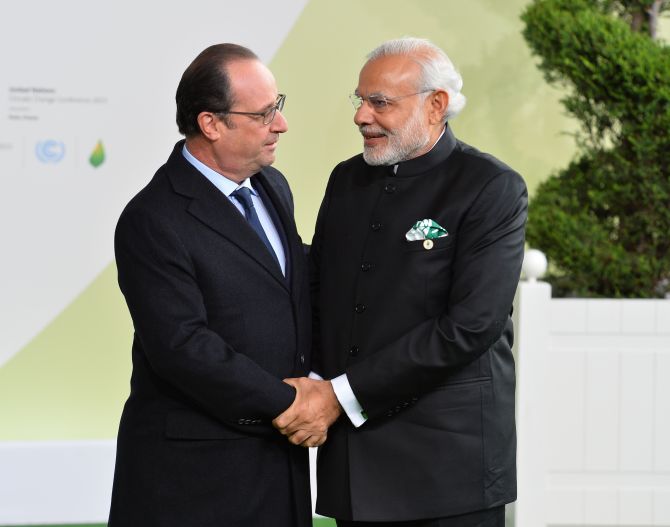 When Mr Modi returned home from Paris with the Rig Veda’s solar incantation on his lips, he might have needed a face mask to re-enter Delhi, notes Sunil Sethi
When Mr Modi returned home from Paris with the Rig Veda’s solar incantation on his lips, he might have needed a face mask to re-enter Delhi, notes Sunil Sethi
World leaders congregating at forums like the climate change conference in Paris have a tendency to couch dire warnings in highfalutin’ rhetoric.
Prime Minister Narendra Modi’s well-scripted eloquence, however, came laced with heavy irony.
His references to 'restore the balance between humanity and nature' and invocations to the Sun God in Hindu scripture as a source to 'power our future' were badly mistimed.
Vedic prayers may not be far from his thoughts, but they were swiftly followed by deadly retribution by the climate gods: torrential rain and floods in Tamil Nadu and Chennai -- a death toll of over 250, the airport shut down -- are a national disaster.
Terrible portents of the calamity in Chennai have been identified, serving as a template of urban disasters everywhere: feverish construction, illegal encroachments, and vast garbage dumps ate into the city’s low-lying wetlands that would normally have acted to sponge off excessive rain.
Chennai environmentalist Nityanand Jayraman points out that far heavier inundations, recorded roughly once every decade since 1969, never resulted in such horror stories.
The choking of natural drainage now brings monsoonal Mumbai to its knees year after year.
In June 2013, floods and landslides in Uttarakhand left nearly 6,000 dead, with the army, air force and paramilitary evacuating 110,000 stranded pilgrims and locals.
A key to the Uttarakhand floods was unchecked tree-felling and rampant hillside construction.
When Mr Modi returned home from Paris with the Rig Veda’s solar incantation on his lips, he might have needed a face mask to re-enter Delhi.
Many of its inhabitants need them before stepping out in one of the world’s most polluted capitals; Delhi’s schools routinely recommend them for children.
A dirty, Dickensian fug renders airport visibility low and plane take-offs chancy.
Newspapers carry scary pollution monitors and daily bulletins titled 'Death by Breath'.
When New York Times correspondent Gardiner Harris wrote an impassioned piece in May on how he was forced to leave the city because of breathing difficulties faced by his eight-year-old son from its “poisonous air”, he was criticised as being unduly alarmist.
Today many would regard his piece as poignant and prophetic.
Dinner-party conversations now regularly revolve around which make of air purifier is best.
Scientifically their health benefits seem debatable but the current craze may be certified by the US embassy buying 1,800 in advance of Barack Obama’s visit and some brands reporting soaring sales -- up from 20,000 a year to 7,000 and 10,000 a month.
Entrenched business lobbies and trade unions paralyse government action to restore clean air to the capital.
A ban on diesel vehicles is an obvious solution but, in practice, seems as impossible as banning plastic bags -- layers of them coat everything from railway tracks to rubbish heaps.
Their manufacture continues unabated in inner-city workshops. Illegal burning of garbage mountains is a major pollutant (like burning crop stubble in rural districts) but the simple concept of segregating garbage into recyclable waste would mean head-on collisions with powerful municipal employees and agriculturists.
As in most of the country, Swachh Bharat is an empty slogan conjured to capture TV eyeballs from the lofty recesses of the PMO.
We know clean renewable energy -- part of Mr Modi’s Sun God mantra -- is expensive; but in 2014, there was a proposal that all central government offices should convert to solar panels to set an example.
No tattle has been heard of this idea in major practice.
The dusty miasma from unbridled construction is ascribed to the 'political-builder' mafia but, in truth, government itself, being the biggest landowner, is also the largest polluting real-estate magnate.
An argument is raging at the Delhi Urban Arts Commission to shrink the area of the Lutyens’ Bungalow Zone -- the green heart of the political and bureaucratic establishment -- by increasing floor area ratios and allowing high-rises.
The chair of the DUAC says this is the way to save 'crumbling' Lutyens’ bungalows and to give 'cramped' government officials, ministers and members of Parliament more space.
Close to where I live, the large tree-shaded 1960s enclave of government housing, Kidwai Nagar, has lately vanished.
Behind gigantic metal screens is rising a complex of residential towers, shopping malls and commercial spaces -- all by the government, for the government.
Delhi’s days of winter sunshine and crisp mornings ringing with birdsong are a thing of the past.
Gone is its image of a garden city devoted to climate gods: children chased fireflies in public parks, retired folk tended flower and vegetable patches, and the annual flower show and rose show were huge seasonal draws. Indira Gandhi considered it her civic duty to attend these.
Narendra Modi thinks it’s his planetary prerogative to give lectures on Surya Namaskar in Paris.
How is he appeasing the climate change gods at home?
Image: Prime Minister Narendra Modi and French President Francois Hollande greet each other at the launch of the International Solar Alliance. Photograph: Kind courtesy, MEA/Flickr











